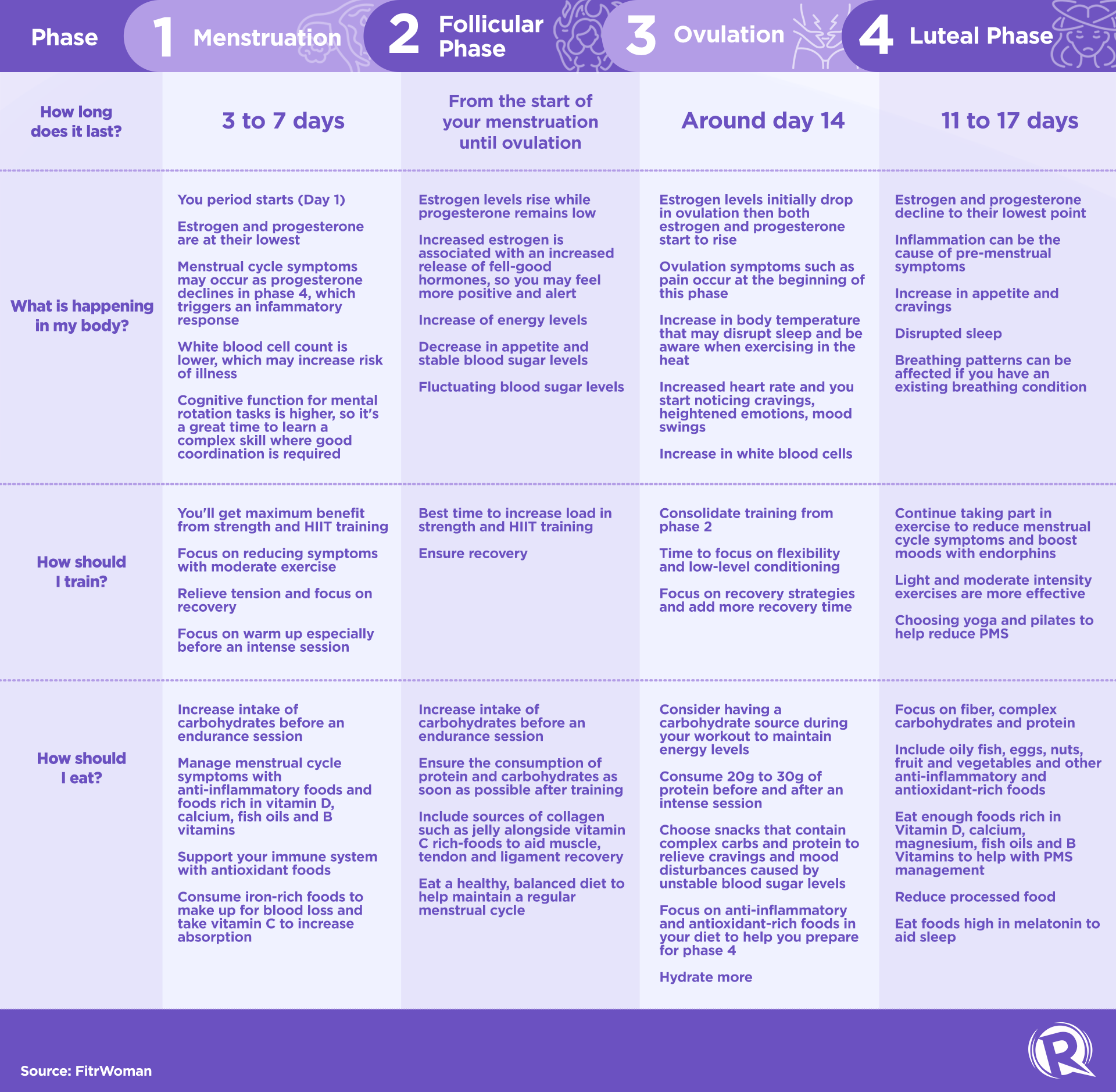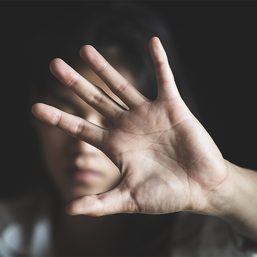SUMMARY
This is AI generated summarization, which may have errors. For context, always refer to the full article.

When Martie Bautista and her brother started a strength program together, she can’t seem to figure out why she couldn’t keep up.
“I don’t know like for some reason he could just keep going throughout the program but there were some days in a month, where I just felt so tired and so fatigued and so exhausted,” said the Kaya FC women’s football player.
“I kept asking him what was wrong and he was like: ‘Maybe you’re not doing cardio enough or maybe you’re not drinking enough whey and stuff like that.’ But we were doing absolutely the same thing, but there were still days, especially coming up to my period where I felt tired.”
It was only when she started looking up on the female cycle that she discovered how her period can affect her performance in training, but more importantly, how it’s possible to take control of it.
Why is the world so uncomfortable talking about periods?
Unfortunately, women’s health continues to be a growing study in the world, leaving many strength and conditioning (S&C) trainers, especially men, with insufficient knowledge about the female body.
When a female athlete goes through her period, Filipino coaches resort to taking it easy on her when she experiences pre-menstrual symptoms (PMS) like cramps or being more cautious when she’s more emotional.
Philippine wushu star Agatha Wong trains in a predominantly male team with an all-male coaching staff.
According to Wong, though she appreciates the understanding of her male coaches, she feels that her male teammates treat the subject to be taboo.
“Based on my experience, they get uncomfortable because when I say na: ‘Masakit na ang puson ko’ (I’m getting cramps), they’ll just tell me: ‘Okay, you can rest’, they don’t want to ask me how it hurts,” shares Wong.
Thankfully, the 2019 Southeast Asian Games double gold medalist credits her head coach for being open-minded about how normal the female cycle is.
But in order to normalize periods for men, the stigma has to change in a woman’s perspective first.
International School Manila (ISM) physical education (PE) teacher Cassandra Till, who is an advocate of training according to your female cycle, remembers how disappointed she felt when she got her first period.
“From the moment I got my first period, I saw it as something that was another barrier to me,” shares Till.
“I actually remember like the day I got my period, my mom and sister and I had gone to my mom’s gym, and it was like girls day out and we were gonna go swimming! I was only 14 and really, the most excited about the day out.”
“And I got my period in the morning. I didn’t make the connection as to what it was and spoke to my sister like: ‘What’s this?’ And I was like: ‘That’s it. Day over. We need to go home. I’m not going to be able to do any of the fun things that we’re supposed to do.’”
Wong also recalled the times she needed to hide the fact that she got her period on the day of her event. This made her feel more pressured not to use her discomfort as an excuse when her performance was bleak.
“I don’t want to tell them that I am performing bad on a certain day because I have my period. Ang sama pakinggan (It doesn’t sound good), so I just kind of have to suck it up,” says Wong.
Revolutionizing women’s sports using the female cycle
“Hey, I’m on phase 4!”
This is a pretty normal statement that players from the Chelsea FC Women’s and the US women’s national football team would shout across the field.
When the US team – led by stars Megan Rapinoe and Alex Morgan – won its fourth World Cup title in 2019, high-performance coach Dawn Scott revealed that the squad used period tracking and considered it as their breakthrough strategy to win.
Hormones play a big factor in performance and the female cycle is the natural occurrence of the changing levels of estrogen and progesterone in a woman’s body.
But when stress is added to the mix, the equilibrium gets disrupted. An elite athlete’s training load and schedule could also be a form of stress to the body, thus affecting the female cycle.
“When our body experiences stress, it wants to protect you and protect its ability to reproduce and so anytime we have excessive levels of stress in our body, our body will protect itself by shutting down the menstrual cycle,” explains Till.
“It’s really important that we understand what’s happening to our body during our menstrual cycle and understand when our body can cope with higher levels of stress versus when we need to be a little bit kinder to our bodies and reduce the stress levels and allow our body to recover and make sure that all the benefits we’re getting from exercise can actually be put into place in our body repairs and get stronger.”
More than maximizing the strength gains a woman’s body can get, this also decreases the chances of injuries.
Filipina athletes like Bautista and Wong have struggled with multiple injuries in their sporting careers, which they cannot explain because of the non gender-based programs they go through.
“There was one season where 6 of my teammates got ACL all at the same time. And [Cassandra Till said] you can’t just say that’s coincidence because training programs here don’t really take the female cycle into account,” says Bautista.
Though Wong sees some benefits of training under the same program as men, she has also experienced putting her body under excessive stress that led to a grade 2 slip disc back in 2018 before she copped the Asian Games bronze.
“I thought I just pulled a muscle, but I ignored the cues until I was brought to the emergency room,” says Wong, who also had her fair share of moments in the clinic because of dysmenorrhea.
Working with your period, not against it
With these new studies, women now can work with their menstrual cycle and see it as a sign of health.
The female cycle is divided into 4 phases that show how the different stages of how estrogen and progesterone fluctuate and affect your body – including dealing with PMS.
By tracking your cycle using apps like Clue and FitrWoman for athletes and fitness enthusiasts, you’ll be able to apply the specific ways to train and fuel your body during these phases.

According to Till, tracking her period has helped her become more aware of her body’s tendencies that she would plan her life – including her work and social life – according to her period.
“It’s so empowering knowing my body this well. Now I really understand what’s going on with my body and not just your body, but your mental state,” says Till.
But most of all, Till says that recognizing the female cycle as a vital sign of health teaches women to be kinder to their bodies.
“People do feel more emotional leading up to their period, perhaps a little bit less tolerant of people and find it a little bit more challenging to kind of regulate their emotions. However, don’t ignore those emotions,” reminds Till.
“You’re gonna feel a bit worse about it, perhaps leading up to a period, but that doesn’t mean that those feelings and emotions aren’t real. [We don’t feel as stressed about it when we get our periods], but those feelings are there for a reason. So it’s your body’s way of being like, look at this, and deal with it, please.”
Empowering women in sports
As a Filipina athlete, Wong hopes these new studies will normalize the conversations of the female cycle with her male peers.
“We shouldn’t have to be apologetic about it. We shouldn’t have to think how the person would feel uncomfortable with me talking about it, because it’s really normal and every girl has it,” says Wong.
A part of normalizing the conversation in society is to get your peers involved in tracking their own cycles, which will help build stronger bonds with other women and understand what they’re going through.
“My friends and I are more in tune with each other like our cycles are either exactly the same or exact opposites. That’s female empowerment right there and really vocalizing how our bodies are feeling,” shares Till.
For Till – who dreams of educating Filipinos and the rest of Southeast Asia about her cause – the growing knowledge on women’s health is something to celebrate because it is continuously showing that women are more capable in other aspects than just becoming mothers.
“Let’s break down the taboo, let’s take away the stigma relating to female cycle and stop seeing it as something that debilitates us as women and holds us back, and something we shouldn’t speak about,” says Till. “Actually make it something to celebrate.” – Rappler.com
Add a comment
How does this make you feel?


![[Dash of SAS] Making abortion a constitutional right](https://www.rappler.com/tachyon/2024/03/Its_true_-_Flickr_-_Josh_Parrish-1.jpg?resize=257%2C257&crop=125px%2C0px%2C768px%2C768px)
![[WATCH] Spoil me but respect me: A sugar baby’s story](https://www.rappler.com/tachyon/2024/03/titlecard-03.jpg?resize=257%2C257&crop_strategy=attention)

There are no comments yet. Add your comment to start the conversation.